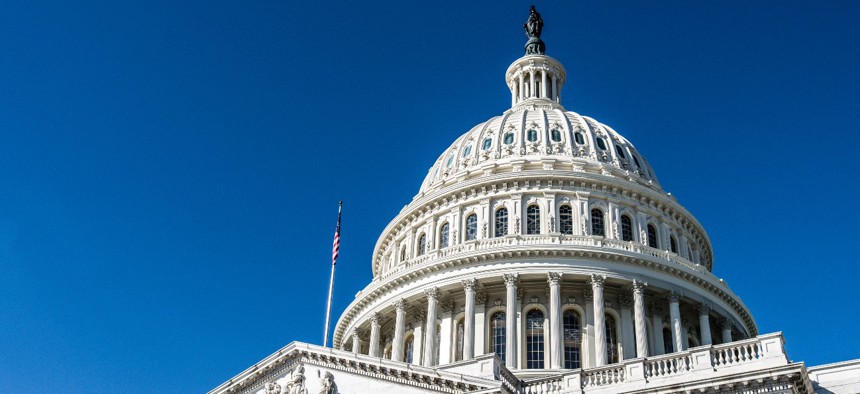
Phil Roeder / Getty Images
Hiring and Death Benefits Reforms Are Moving Forward on Capitol Hill
A weekly roundup of pay and benefits news.
The House Oversight and Reform Committee on Wednesday voted to advance measures aimed at reforming federal employee death benefits and the federal hiring process.
The Honoring Civil Servants Killed in the Line of Duty Act (H.R. 7376), introduced by Rep. Gerry Connolly, D-Va., increases the death benefits payable to the families of federal workers who die on the job from $10,000 to $100,000 and increases the government’s coverage of funeral expenses from $800 to $8,800. Those figures would automatically increase each year in line with inflation. A similar bill advanced out of the Senate Homeland Security and Governmental Affairs Committee on a bipartisan basis in February.
The amount of money the federal government provides federal worker families upon on-duty deaths has not been adjusted since 1997, while the funeral expense coverage offered by the government has remained at $800 since 1966. The bill also would bring death benefits for civilian employees in line with what the government pays to members of the military who die while on duty.
Connolly said that the government pays these benefits to the families of 24 federal workers on average per year, and the Biden administration has indicated agencies can cover the expenses from increasing these payments without an increase in funding.
But Republicans on the committee objected, arguing that federal workers already get enough in terms of pay and benefits.
“I applaud their dedication and service; however, federal civilian employees and postal workers already receive world class pay during their service and their dependents are eligible for substantial benefits upon their deaths,” said Rep. James Comer, R-Ky., the committee’s ranking member. “In addition to discretionary authority to provide a $10,000 gratuity for federal workers who die in the line of duty, dependents are also entitled to compensation under the Federal Employees Compensation Program . . . generally receiving two-thirds of the deceased employee’s salary for the rest of their life or until they remarry.”
This argument incensed Connolly, who noted that most states, including Comer’s home state of Kentucky, already offer benefits in line with the bill’s provisions.
“We’re talking about ... public servants who give their lives in the line of duty,” he said. “I don’t think any one of us wants to face the family of a firefighter who died trying to save people’s homes and lives and say that he’s already an overpaid public servant and deserves no more. Is that really what we’ve descended to?”
Other GOP lawmakers were more receptive to the bill, but suggested tailoring the language to ensure it applies only to dangerous jobs like federal firefighters, first responders and other emergency workers.
“My objection would be a carte blanche definition of a federal employee, and I see where you’re getting these numbers from,” said Rep. Clay Higgins, R-La. “I’m looking for a way to support the spirit of your bill, but there should be further definition of who would receive this benefit.”
Connolly committed to working with Higgins and other Republicans to “tighten” the language, and the bill advanced by a 26-14 vote.
The committee was more unified behind a bipartisan bill aimed at codifying recent reforms to the federal hiring process. The Chance to Compete Act (H.R. 6967), introduced by Reps. Jody Hice, R-Ga., and Ro Khanna, D-Calif., confirms that skills-based assessments administered by agency subject matter experts are acceptable job assessments in the competitive hiring process, and allows agencies to share the assessments of qualified job candidates with one another. A similar bill in the Senate advanced out of committee in February.
The bill’s provisions echo a number of successful pilot programs aimed at making the federal hiring process faster and more effective in evaluating which federal job applicants are qualified for jobs at agencies that began during the Trump administration and have been scaled up under President Biden. The bill’s provisions also fit with a number of key human capital priorities in the president’s fiscal 2023 budget proposal, as well as the Office of Personnel Management’s new five-year strategic plan.
“Too frequently, the hiring process is based on whether someone has a degree, whether or not the degree has anything to do with the position being sought,” Hice said. “Currently, hiring managers also have to rely on self-assessments filled out by applicants and that process itself can become very messy to determine the strengths and weaknesses of the individual . . . This bill allows agencies to develop appropriate skills-based examinations so that applicants can show what they actually know.”
House Oversight and Reform Committee Chairwoman Carolyn Maloney, D-N.Y., said the House version makes a number of tweaks based on input from the Biden administration to grant agencies the ability to request waivers in some circumstances, and to provide OPM with flexibility to make adjustments to the policy during implementation.
The bill passed unanimously via voice vote. Both pieces of legislation will now head to the House floor for consideration.







